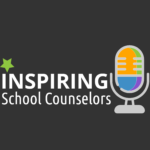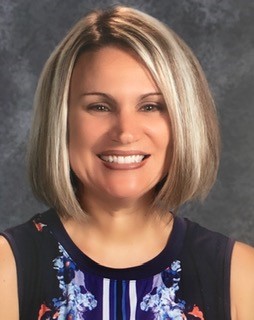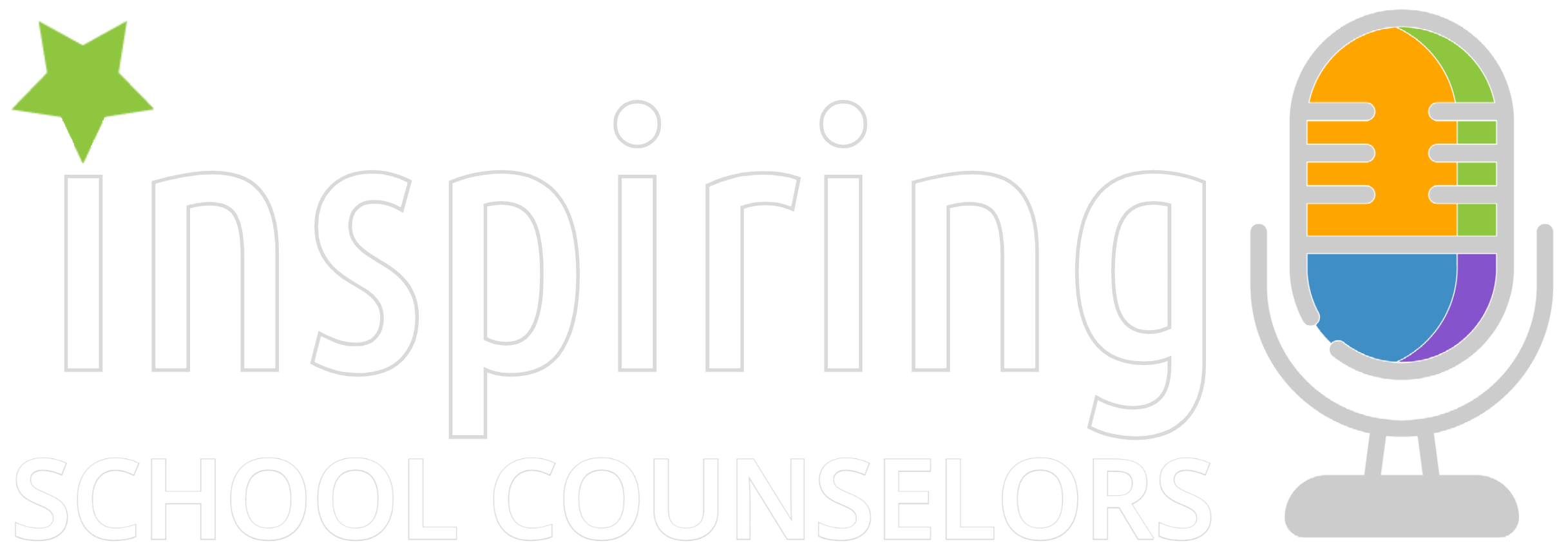With much enthusiasm, guest school counselor Lezlie DelVecchio-Marks shares with us how the growth mindset has not only helped her students but herself, the challenges of achieving RAMP, and the many practical ways she fosters “connections” with her students.

About Lezlie

Lezlie DelVecchio-Marks is the School Counselor at Burchfield Primary School outside Pittsburgh, Pennsylvania. She has been a school counselor for 20 years and in the 2020-21 school year was named Pennsylvania School Counselor of the Year. She is on the board of directors for the Pennsylvania School Counselors Association and her school was just designated a 2022 RAMP School of Distinction.
Resources
Lezlie highly recommends these resources:
- Hatching Results for Elementary School Counseling-Tier 1
- Hatching Tier 2 and 3 Interventions in Your Elementary School Counseling Program
- The ASCA National Model, Fourth Edition
- ASCA National Model Implementation Guide, Second Edition
- Making Data Work, Fourth Edition
We Want to Hear from You!

What’s your best advice for other school counselors? Who has influenced you? What books do you recommend? We want to know! Please take a few minutes to complete the Inspiring School Counselors form.
Subscribe
Inspiring School Counselors is available on these podcast apps and others. If you can’t find the podcast on your favorite app, let us know and we’ll make sure we get there. If you prefer to listen in your browser, visit https://inspiresuccess.org/podcast every week for a new episode. For new episode notifications and more, follow Inspire Success on Facebook, Instagram, or Twitter.
Transcript
A rough transcript follows.
Matt Fleck:
Hi, everyone. Welcome to the Inspiring School Counselors podcast. I’m Matt Fleck, and we’re here several times each month to connect you with school counselors from around the country, who we’ve asked to share their wisdom, their resources, their practical ideas with us to make your role as a school counselor just a little bit easier. You’re in for a treat today as Aimee Portteus talks with an elementary school counselor about teaching and living the growth mindset, including how it helped her implement the ASCA National Model and two student clubs she organizes that are truly impressive. Here’s Aimee and our guest who introduces herself.
Lezlie DelVecchio-Marks:
Well, my name is Lezlie DelVecchio-Marks and I am an elementary school counselor in a great primary school located in a suburb of Pittsburgh, Pennsylvania. And I’ve been a counselor for 20 years and of those 20 years, I have been in an elementary school 19 of them. So I am elementary all the way!
Aimee Portteus:
Elementary, all the way you feel some power in being an elementary school counselor, huh?
Lezlie:
Yes. <laugh>
Aimee:
Awesome. Awesome. Okay. Lezlie, can you talk to me a little bit about growth mindsets and how important that is in our field of school counselors?
Lezlie:
Well, I would like to think I’m very growth minded growth mindset is really important for our kids because I think if we just try to keep a positive outlook and not give up and be resilient and get through our adversity, then that helps us in the future to be more willing, to try things and to not give up and, and, and not have that sinking thinking that some of us talk about and some of us have even as counselors, you know, we sometimes can perseverate on things too, but if we try to get our, our students, even at a young age to try to think big and not to give up and, and, and have that yet, then they’d be more willing to try things and try to problem solve and get through those adverse times in our lives, which we are going to have, whether it’s a small problem or a big problem. So growth’s mindset is a really nice concept. I think that we should even be focusing on at a very young age and keep in mind for ourselves too, as their teachers and role models.
Aimee:
Can you think of a way that growth mindset has impacted you?
Lezlie:
Yes. I can think of a way that growth mindset has impacted me. Um, usually one of my mottos is when I commit I don’t quit. So for example, when I had my mindset on achieving RAMP for my school, about four years ago, I didn’t even really at that point fully understand the ASCA model because I graduated at a time when there wasn’t one. Um, so I would attend all these professional development opportunities. And I said to myself, we’re gonna get RAMP at my school. We’re going to get RAMP. And I didn’t really know what RAMP was. And I remember when I set up my advisory council three years ago, I was obsessing about understanding the ASCA model, which at that point was the third version. It was tough because I was good and then they changed it to the fourth model and I thought, okay, we’re just gonna revamp all of my thinking.
And I did not quit. I went, learned all the things I had to do, probably obsessively contacted all kinds of wonderful counselors in the nation to try to learn the process and last October we submitted our RAMP application. And, um, we found out that not only did we get RAMP for our school, our school earned RAMP, but we are considered a model of distinction in the state of Pennsylvania. So, growth mindset. I did not give up. I didn’t even, and I always say start, you know, just don’t give up because you just learn every day and, and stick with it.
Aimee:
Congratulations!
Lezlie:
Thank you!
Aimee:
I think that’s really important. What you just said that we’re, we’re, we’re comprehensive counseling for the rest of forever at this point.
Lezlie:
Yes. And, and really you, we shouldn’t do it just for the award. That’s a snapshot of what you do. So it should be a part of what you do all the time, because that’s why we do it. It’s really for the students in our delivery of services, that’s just a bonus that says, yay, you are doing it. Right. Um, so it’s, it’s something that I, I hope, um, people would just dive into for the future. For example, um, school counselor, friends, if you’re thinking about this, I didn’t even know how to make a lesson plan. I don’t have an undergraduate in teaching. So my lesson plans used to be little handwritten agendas for groups or, uh, last classroom lessons. I used to do all these things, but I didn’t have anything officially planned out. And when you start using those templates and you start really following a lesson plan, it does it, it keeps me, keeps me honest. I guess I stick to the plan. I, I, my timing is better. I make sure that everything that I’m teaching is aligned with standards and my objectives match that. So there’s an official guideline for what I’m doing and kids get so much more out of it. And when I do my assessments now, I’m like, okay, this is working. So it really does help to keep you more organized and more efficient with the counsel with this students.
Aimee:
That’s awesome. Okay. So let’s move on just a little bit here. I’m gonna read you a couple of quotes that I think you’ll recognize mm-hmm <affirmative> and we would love for you to respond to them for us. Um, kids are connection seeking, not attention, seeking, be the connection.
Lezlie:
Yes, we are so fortunate as school counselors that we can be that one person who could change the trajectory of a student’s life. And a lot of times it’s so, um, rewarding as the school counselor to see or hear things from students in, for example, um, that a student says, you know, I, this is something that’s really been, even in elementary students, this is something that’s really been weighing on me, but I knew I could tell you because you’re the one person I knew. Absolutely. Who would not judge me and support me. And these are big things that they’re talking about too. And I’m sure as students get older, it’s even bigger in a sense. So it’s, it’s because a school counselor really has a chance to be so present. If we’re doing a lot of tier one interventions, we’re in all of those classrooms, so they know us.
So that’s number one. We could talk about our role from the very beginning of the year. I talk about what a school counselor does. So they know what I do. They know how to reach me. Um, so they feel connected in that way. But when we do, I do other opportunities too, where I have lunch with all of the kids, we do something called connections cafe, where, um, I invite, uh, like classrooms of students or at least half of a classroom at a time to meet with me and other staff members in the, in the building. We just have lunch together. So we just, I have a nice breaker activity where we learn some things about each other and they love it because they want that connection. So when you start to build that rapport with students from the beginning, then they can learn, but they need to connect first because I always say, and this is probably one of my other quotes you can’t add when you’re mad. So you gotta feel connected and you have to feel comfortable and then you can get to the content. But connection is so important. And sometimes we’re the only, we might be one of the only sources of support and, um, acceptance in their lives. So this is a really important job for most educators, but especially school counselors.
Aimee:
Absolutely. Thank you. I understand that you have a girls rock group and also a mega man group.
Lezlie:
I’ve had a girls rock group for third grade girls, cuz my building is, um, K through three and we had a Megaman group for boys and in the girls rock group, we, um, met during lunch and recess and we would just talk about different topics, including self-esteem self image, body image, relational aggression, problem solving, and things like that. And trying to get the students to love themselves for who they are, because I know as things start to change in our bodies, that can change. Uh, and with the boys, I would co-facilitate that group with my principal. Who’s a male and a really great role model. He’s excellent. And we would talk about things that would affect boys more. So at this age with sportsmanship, we talked about chivalry. We would even teach the kids how to tie ties. They would wear their ties on Wednesdays and greet the kindergarten and first grade students at the door, it was really cute. So, um, at the end of one of our, this was pre-pandemic, but to just kind of pull together both of those group opportunities, we had a, we had a night, it was a part of our showcase night where the girls actually performed singing and dancing to the song This Is Me from The Greatest Showman. And we actually had staff members participate in that too. It was so great. I mean, we had like 14 staff members also dancing with them and singing and we had the boys dressed up that night and their little ties. They were the hosts for the, for the event. They were the MCs. They supported those girls. They were being, um, just very chivalrous and it was a nice way to get the parents to see all that they had learned. And it was, and we had like a Megaman breakfast where the boys got to serve their parents and eat with them and talk with them. It was just a cute little example of how you can inspire students at even a young age and teach them those skills with the support of so many other people in the building to, to build those connections as well.
Aimee:
What a fun way to get non-cognitive skills built in!
Lezlie:
Yes. Awesome. Awesome. Non-cognitive skills. I gotta use that, Aimee. That’s good.
Aimee:
Yes. You take some notes there. Yes.
Lezlie:
I’m writing down non-cognitive skills. <laugh> That’s awesome. We learn every day, Aimee, we learn.
Aimee:
Exactly!
Lezlie:
As school counselors. I think another thing that we just have to keep in mind and our profession, um, I think we really need to take a look back at, uh, take a step back and make sure that we are, if, if we are skilled in certain areas, if we understand the ASCA model, if we have really great lessons that we think other people should know about, I think we should really try to help each other out and share those things. Because I think a lot of school counselors that may not be, um, aware of these things, or may not know how to change or may be feeling, um, maybe discouraged in their profession or feel like they are doing a lot of non-school counseling activities and not seeing students and are being very, uh, reactive. I think we need to extend ourselves a little bit to help them.
I’m always willing and, and, and I am a representative in my area. Um, so I can, I have access to people more, but I think it’s really important for us, even in our districts to kind of reach out to our fellow counselors and try to, um, help them to advocate for themselves because it really comes back to advocating for our students. And we have to educate first because a lot of our administrators and people in our districts are not being cruel or unsupportive, but they don’t understand our role. Especially if school counselors don’t understand their role. So I just look out to the other counselor leaders and, and encourage you to reach out to people and educate them so that they can educate the people they’re with about your role. So we could advocate for our profession, which in turn would advocate for our students. Because the more time we have with students, the more magic we can make happen in their lives.
But if we can’t get to them, or if we’re focusing our attention on other things that are taking us away from the students, then, then we’re not able to be those, um, connection makers and inspire them and be there one person that could, you know, change the trajectory of their lives. So it all comes together. And I think advocacy is a big piece of that. So don’t be afraid to be passionate about the profession because your passion will help you to help students. So that’s, that’s my words of wisdom of the day for school counselors.
Aimee:
That’s awesome. That’s very encouraging. So I think we’ll end on that unless you have anything else you want to add.
Lezlie:
No, but you’re so patient with me. Please apologize to this nice man who has to clip this all together with phone calls and email going off. I’m sorry. I heard those too.
Aimee:
No, no. <laugh> You don’t worry about that at all. I really enjoyed this conversation.
Lezlie:
Yeah. You are just fresh as Aimee. Thank you for doing good things for school counselors.
Aimee:No problem. <laugh> talk to you soon. Thank you.
Lezlie:
Take care,
Matt:
Aimee and I got to meet Lezlie in person at the ASCA National Conference this summer and she is just a ball of fire. So fun. Lezlie has also shared with us a ton of resources – including her contact information – which you can find on our podcast website at inspiresuccess.org/podcast. And, while you’re there – and I never ask this but I am this time – could you take an extra minute to give us a rating. Apparently, that helps other school counselors around the country find us and so they too can connect to wonderful people like Lezlie.
And if you’d like, while you’re there, you can also find a ton of other podcasts AND and answer a few questions if YOU would like to be a future podcast guest. We’d love to meet you.
That’s it from us. Thanks for listening. See you next time.
